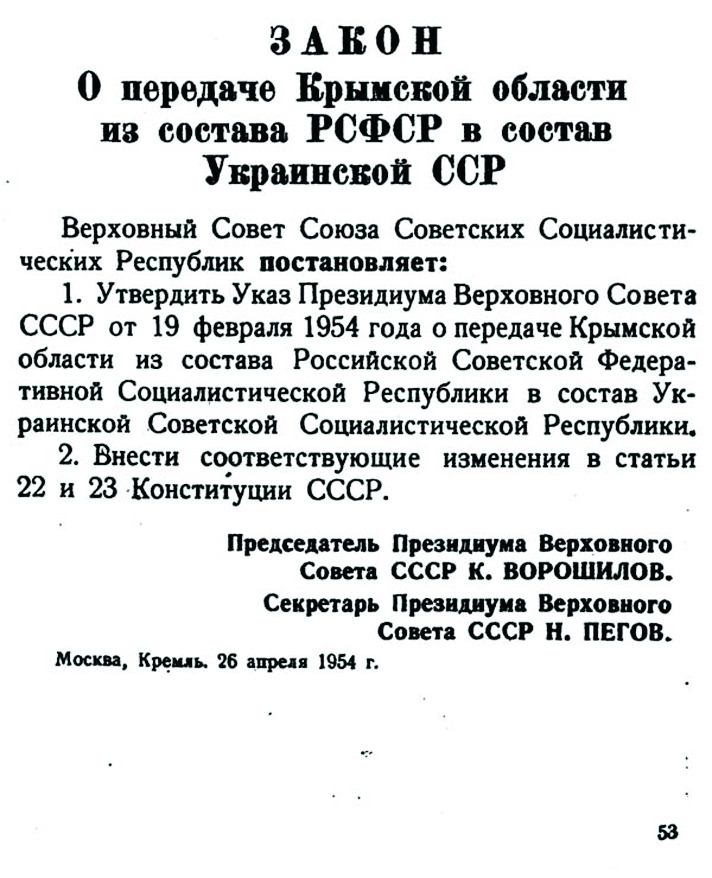On 19 February 1954, the Presidium of the Supreme Soviet of the Soviet Union issued a decree transferring the Crimean peninsula from the Russian Soviet Federative Socialist Republic to the Ukrainian SSR. It is still an important issue of intercultural relations and political speculations.
This event almost immediately became the occasion for the formation of a number of historical myths. They spread during the Soviet era, especially in the Russian Soviet Federative Socialist Republic, and later received new life in the Russian Federation.
First myth. Until now, first of all in the Russian Federation, the fact that according to the then legislation of the USSR, the Supreme Soviet had no right to change the borders between the republics of the Union is still discussed. Therefore, this Decree is illegitimate. But less mention is made of the adoption by the Supreme Soviet of the USSR on April 26, 1954 of a law on the basis of which amendments were also made to the Constitution of the USSR. That is, a few months later, the legislative procedure for the transfer of the Crimean region from the Russian Soviet Federative Socialist Republic to the USSR was completed. This law met all the requirements of current Soviet law, as well as international law, which determines the right of cession - the voluntary transfer of sovereignty by one state over a certain territory to another state by agreement between them.
Second myth. The transfer of Crimea was the sole decision of the leader of the Communist Party of the Soviet Union N. Khrushchev and from his side became a kind of gift to the USSR and the Ukrainian people. In fact, the process of transferring this territory began in late 1953, when all party and political decisions were made collectively. And the full fullness of power N. Khrushchev received only in 1957.
Third myth. Ukraine received the "flourishing Crimean peninsula" for free. In fact, post-war Crimea, after the deportation of Crimean Tatars and a number of other peoples of the peninsula, was an example of a certain economic decline. Renowned Ukrainian historian Stanislav Kulchytsky rightly remarked: "Using the stereotypes about Crimea - an all-Union health resort, beautiful and cheap, rooted in the minds of post-war generations of former Soviet citizens, Russia's state propaganda completely bypasses the fact that at the time of the transfer of the peninsula dream resort" [1]. At the same time, economically, Crimea was more connected with Ukraine than with the Russian Soviet Federative Socialist Republic. Thus, this was not a special act of gratitude to the Ukrainian people on the part of Soviet leaders, or a manifestation of Khrushchev's "Ukrainian local patriotism." In fact, the transfer of Crimea was a large-scale event, subject to the purely pragmatic task of the Soviet economy.
Fourth myth. The transfer of Crimea was an example of the Kremlin's concern for Ukraine, a fact of the republic's exceptional position in the USSR. But this is not the case. First, the enormous burden of the peninsula's economic revival was shifted to Ukraine, which was itself in a state of postwar reconstruction. Secondly (and this fact is usually preferred not to be mentioned by Kremlin propagandists), Ukraine in Soviet times not only gained but also lost certain territories. Thus, as early as 1919–1928, the Belgorod region, the Starodub region (northern districts of the Chernihiv province), the Taganrog region, and the Eastern Donbass became part of the Russian Soviet Federative Socialist Republic. In the postwar years, part of the western ethnic lands of Ukraine, by the will of Stalin, passed to Poland.
[1] Kulchytsky S. Transferring the Crimean peninsula to Ukraine: political aspect. Crimea from antiquity to the present. Historical studioe. - Kyiv: Institute of History of National Academy of Sciences of Ukraine, 2014. - P. 500.
February 24, at 6 p.m. (Kyiv time) Historical webinar of "Tkuma" Institute and "Orion" Publishing House “Resistance to Occupation” to the Day of Resistance to Occupation of the Autonomous Republic of Crimea and the City of Sevastopol with experts: Alim Aliiev, Dr. Serhii Hromenko, Dr. Svitlana Kayuk, Dr. Igor Shchupak and others. Broadcasting will be on "Tkuma" Institute YouTube channel.
Welcome!
Library of Museum "Jewish Memory and Holocasut in Ukraine" offers to read publications about transferring the Crimean peninsula from the Russian Soviet Federative Socialist Republic to the Ukrainian SSR
